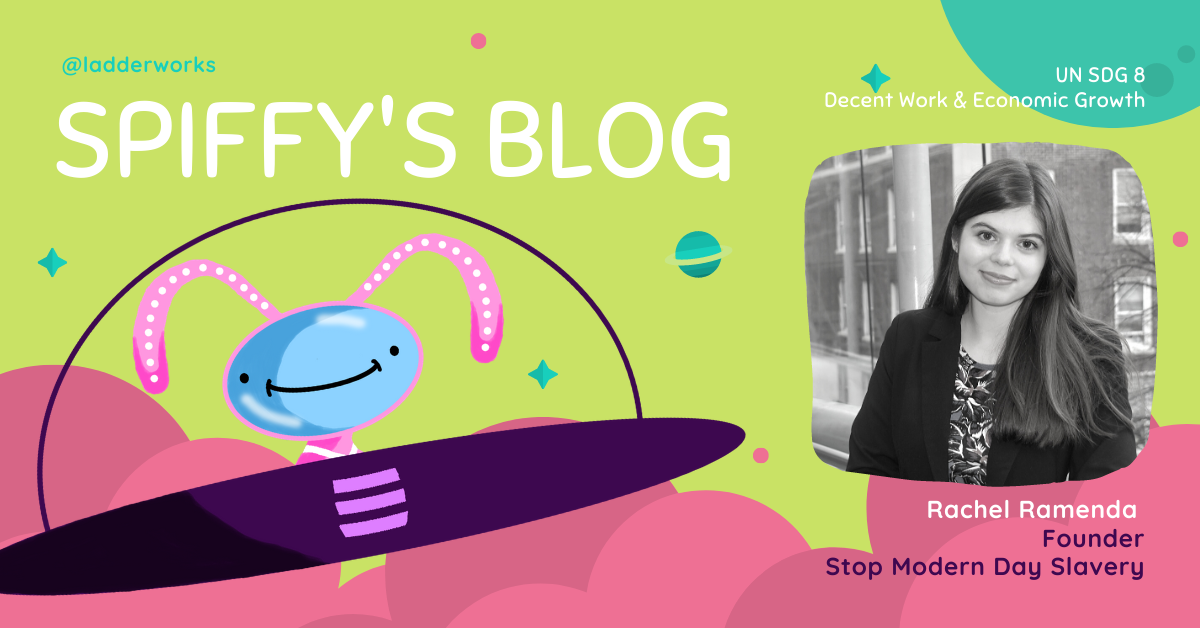Rachel Ramenda: Shining a Light on Human Trafficking
 Hi everyone, Spiffy here, your one and only interplanetary journalist reporting from Planet Earth. I’m thrilled to be talking to Rachel Ramenda, an entrepreneur working to make the world a better place through her work with Stop Modern Day Slavery. Are you ready to be enlightened?
Hi everyone, Spiffy here, your one and only interplanetary journalist reporting from Planet Earth. I’m thrilled to be talking to Rachel Ramenda, an entrepreneur working to make the world a better place through her work with Stop Modern Day Slavery. Are you ready to be enlightened?
Spiffy: Welcome, Rachel! I’m ready to learn all about your start-up and your passionate approach to justice. So tell me , what challenge are you addressing?
Rachel: Thanks so much for having me, Spiffy. I am addressing the huge challenge of human trafficking — an umbrella term that covers multiple types of exploitation, including forced labor, child labor, and sex trafficking. My organization, Stop Modern Day Slavery, educates the public on this human rights violation through online articles and social media campaigns. We provide our readers with the tools to identify trafficking in their communities and encourage them to support brands with fair labor practices over those with murky supply chains. Above all, we advocate for freedom, dignity, and fair work conditions for all.
Spiffy: Wow, that’s amazing! What motivated you to start this?
Rachel: When I first learned about the horrors of human trafficking, I took to the internet to learn more about this issue. Unfortunately, I found that there was an extremely limited amount of information, despite the fact that 40 million people are victims of modern-day slavery. The gap between the enormity of this tragedy and the attention it receives disappointed me, and I wondered why human trafficking was not being discussed on social media, in the news, or on television. I could no longer sit by and do nothing— I needed to take action and create change. I needed to be the voice I was searching for.
Spiffy: You are absolutely right, Rachel. And how do you envision this creating more equitable world?
Rachel: We are working toward a more equitable world by fighting one of the greatest inequities of all: slavery. We champion fair wages, safe labor conditions, and the elimination of sexual exploitation. Stop Modern Day Slavery takes a trifold approach to combating human trafficking. First, we create educational content that raises awareness of this abuse. Second, we partner with ethical companies to show our readers they can make a difference by shopping consciously. Most importantly, we work with survivors to amplify their voices and share the work they are doing to end human trafficking.
Spiffy: Can you share about a recent milestone and the impact it has had?
Rachel: Sure, Spiffy! Just a few months ago, Stop Modern Day Slavery celebrated its first birthday! I am so proud of what we have accomplished in just one year. We grew our team to eight people, published more than 30 articles, reached audiences in over 20 countries, and had tens of thousands of visits to our website. I have had countless people reach out and say that they had no idea human trafficking was such a huge issue. They have committed to shop ethically and spread awareness of this subject. Receiving messages like that is the best! The support that we have received illuminates the impact we are making.
Spiffy: What about failure, have you ever experienced it and what did you learn?
Rachel: At the very beginning of founding my organization, I was disappointed by the initial lack of engagement my website received. Although this was disheartening, I did not let it discourage me. In fact, this initial letdown made me work even harder to spread my message! I recruited more team members, spoke with more survivors, and reached out to more companies with fair labor standards. I also learned to lean into my professional marketing experience to create eye-catching headlines, innovative designs, and new strategies to extend our reach and increase awareness of the cause.
 An inspirational illustration by Adrian Glasmyre, created for Stop Modern Day Slavery. (Image courtesy of Rachel Ramenda)
An inspirational illustration by Adrian Glasmyre, created for Stop Modern Day Slavery. (Image courtesy of Rachel Ramenda)
Spiffy: What is something unexpected you’ve learned from someone recently?
Rachel: I learn something new every time I speak with survivors of human trafficking. A recent conversation with a survivor taught me about the shocking prevalence of familial trafficking. Like her, nearly 50 percent of child trafficking victims are trafficked by a family member. She also discussed the psychological effects of human trafficking, revealing that being sold by her own family has left her with anxiety, paranoia, and PTSD (post traumatic stress disorder). Giving survivors a platform provides a therapeutic outlet for them to share their stories and motivates me to fight even harder for an end to human trafficking.
Spiffy: Is there anything else you would love to tell our audience?
Rachel: To anyone looking to make a difference — take that first step, even if it is intimidating. Start a website, a club, or even just a conversation. Speak out about injustice whenever possible, and do not let anyone hold you back! If you truly believe in yourself and your power to create change, you will create the world you want to see.
Spiffy: Rachel, I’ve learned so much. Thank you for enlightening me.
Rachel: Spiffy — thank you so much for speaking with me today! It was an honor to tell you about my organization and my passion for ending human trafficking. Safe travels home!
Rachel Ramenda is a student at Columbia University studying American studies and Hispanic studies. She is the founder of Stop Modern Day Slavery, an organization that mobilizes the public to take action against human trafficking. Rachel is a firm believer in the power of youth to change the world. (Nominated by Millenium Campus Network)


